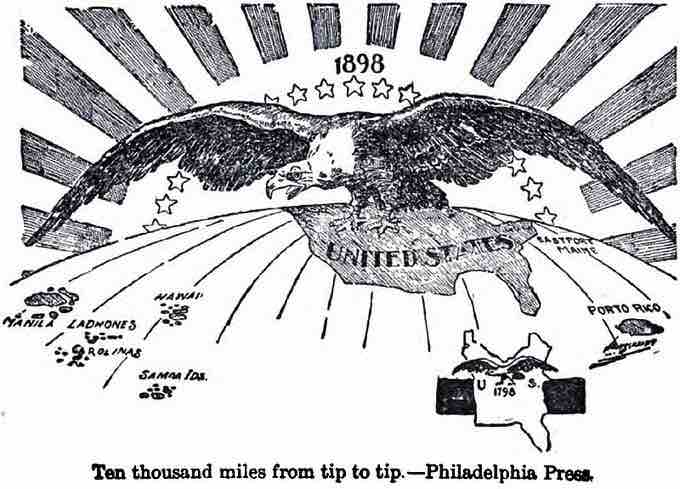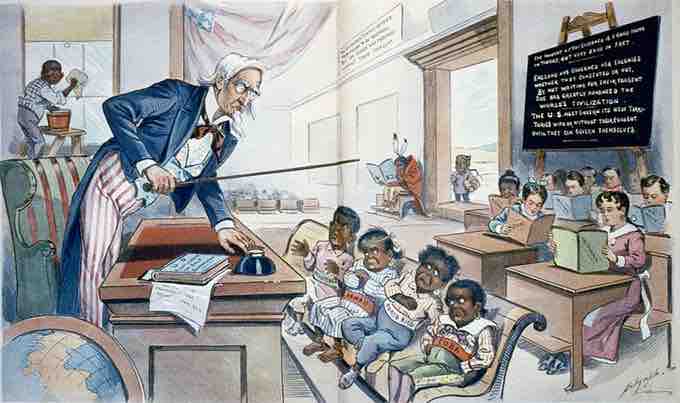Expansion and Power
"American imperialism" is a term that refers to the economic, military, and cultural influence of the United States on other countries. First popularized during the presidency of James K. Polk, the concept of an "American Empire" was made a reality throughout the latter half of the 1800s. During this time, industrialization caused American businessmen to seek new international markets in which to sell their goods. In addition, the increasing influence of social Darwinism led to the belief that the United States was inherently responsible for bringing concepts such as industry, democracy, and Christianity to less developed "savage" societies. The combination of these attitudes and other factors led the United States toward imperialism.

"Ten Thousand Miles from Tip to Tip"
"Ten Thousand Miles from Tip to Tip," refers to the extension of U.S. domination (symbolized by a bald eagle) from Puerto Rico to the Philippines. The cartoon contrasts the 1898 representation with that of the United States in 1798.
American imperialism is partly rooted in American exceptionalism, the idea that the United States is different from other countries due to its specific world mission to spread liberty and democracy. This theory often is traced back to the words of 1800s French observer Alexis de Tocqueville, who concluded that the United States was a unique nation, "proceeding along a path to which no limit can be perceived."
Pinpointing the actual beginning of American imperialism is difficult. Some historians suggest that it began with the writing of the Constitution; historian Donald W. Meinig argues that the imperial behavior of the United States dates back to at least the Louisiana Purchase. He describes this event as an, "aggressive encroachment of one people upon the territory of another, resulting in the subjugation of that people to alien rule." Here, he is referring to the U.S. policies toward Native Americans, which he said were, "designed to remold them into a people more appropriately conformed to imperial desires."
Whatever its origins, American imperialism experienced its pinnacle from the late 1800s through the years following World War II. During this "Age of Imperialism," the United States exerted political, social, and economic control over countries such as the Philippines, Cuba, Germany, Austria, Korea, and Japan. One of the most notable examples of American imperialism in this age was the annexation of Hawaii in 1898, which allowed the United States to gain possession and control of all ports, buildings, harbors, military equipment, and public property that had formally belonged to the Government of the Hawaiian Islands. On January 17, 1893, the last monarch of the Kingdom of Hawaii, Queen Liliuokalani, was deposed in a coup d'état led largely by American citizens who were opposed to Liliuokalani's attempt to establish a new Constitution. This action eventually resulted in Hawaii's becoming America's 50th state in 1959.

Uncle Sam teaching the world
This caricature shows Uncle Sam lecturing four children labelled "Philippines," "Hawaii," "Puerto Rico," and "Cuba" in front of children holding books labeled with various U.S. states. In the background, an American Indian holds a book upside down, a Chinese boy stands at the door, and a black boy cleans a window. The blackboard reads, "The consent of the governed is a good thing in theory, but very rare in fact... the U.S. must govern its new territories with or without their consent until they can govern themselves."
Opposition to Imperialism
The American Anti-Imperialist League was an organization established in the United States on June 15, 1898, to battle the American annexation of the Philippines as an insular area. The League also argued that the Spanish-American War was a war of imperialism camouflaged as a war of liberation. The anti-imperialists opposed the expansion because they believed imperialism violated the credo of republicanism, especially the need for "consent of the governed." They did not oppose expansion on commercial, constitutional, religious, or humanitarian grounds; rather, they believed that the annexation and administration of third-world tropical areas would mean the abandonment of American ideals of self-government and isolation—ideals expressed in the U.S. Declaration of Independence, George Washington's Farewell Address, and Abraham Lincoln's Gettysburg Address. The Anti-Imperialist League represented an older generation and was rooted in an earlier era; they were defeated in terms of public opinion, the 1900 election, and the actions of Congress and the president because most younger Progressives who were just coming to power supported imperialism.